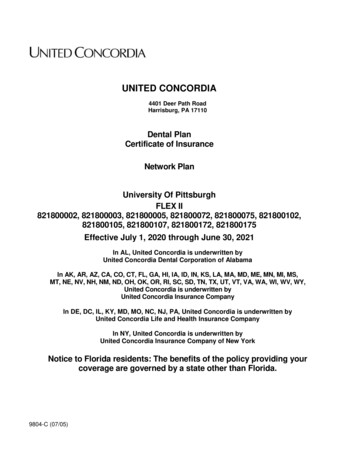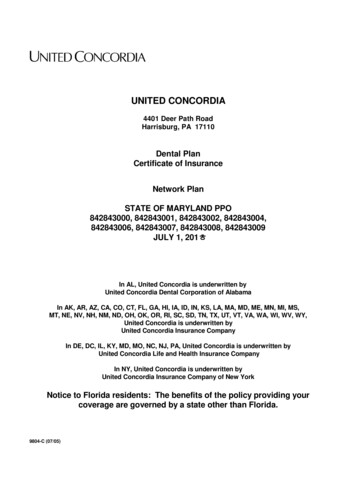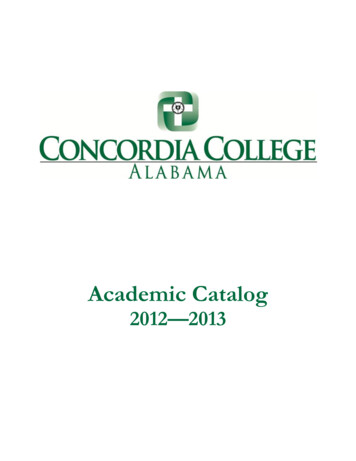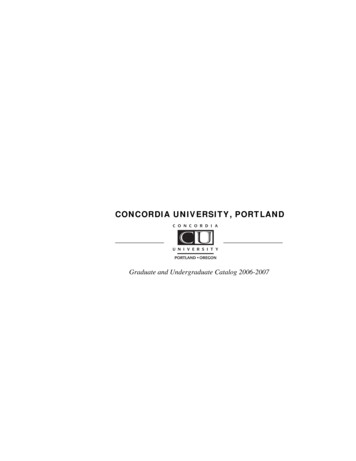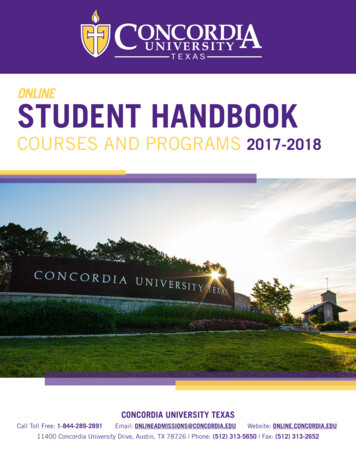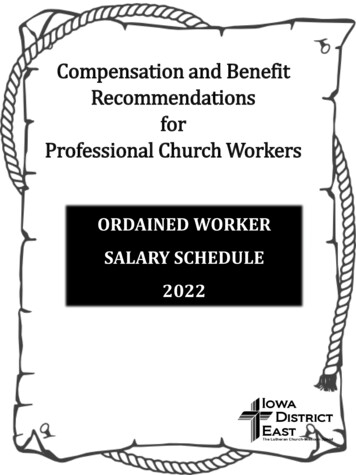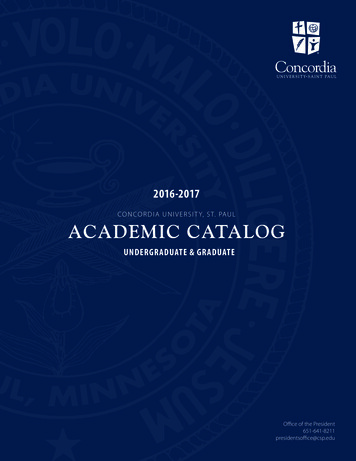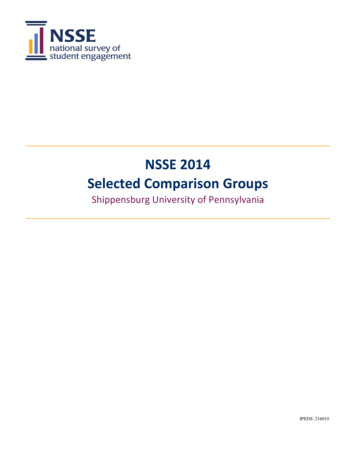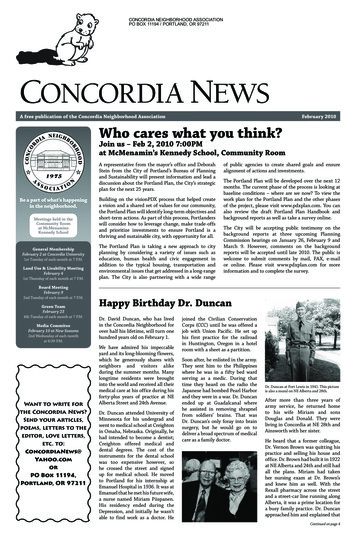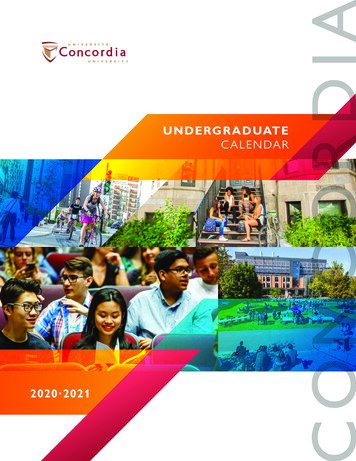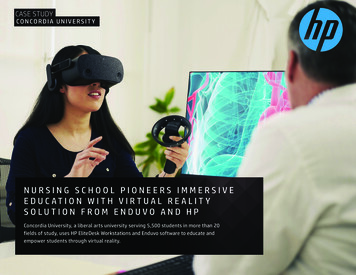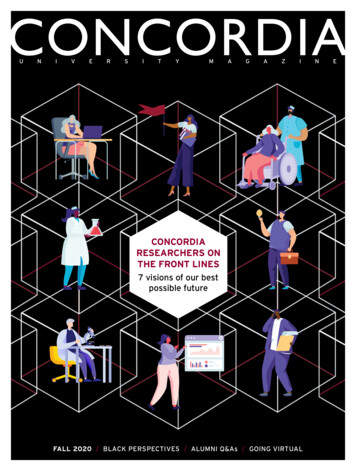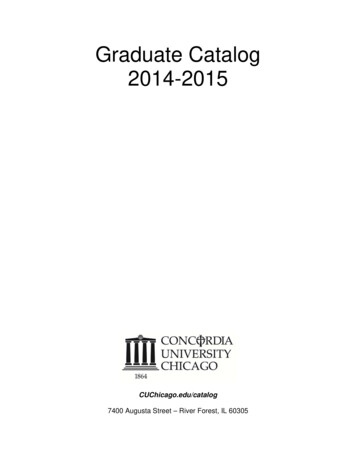
Transcription
Graduate Catalog2014-2015CUChicago.edu/catalog7400 Augusta Street – River Forest, IL 60305
2014‐2015 Undergraduate Academic CatalogUsers GuideThese quick tips will enhance your viewing of this catalog: Click on “Page Thumbnails” (upper left) to reveal a complete listing of every page Click on “Bookmarks” (upper left) to use bookmarks to navigate the catalog The Table of Contents contains direct links to each catalog section Use the page numbers viewer (upper left) to navigate to specific pages, or to simplyread through the catalog To search the catalog document for key words, select the Control and F buttons at thesame time. A new box will appear in the upper right hand corner for you to search thedocument.
Table of ContentsPageUniversity Contact Information12014‐15 Academic Calendar2Accreditation, Certificates, Degrees and Programs3Mission Statement6General Concordia‐Chicago Information7Concordia University Chicago Honor Code10Graduate Admission11Graduate Fees, Financial Policies and Financial Assistance16Academic Information27Graduate Student Services43Post‐Baccalaureate Endorsement and Certificates Programs49Master of Arts Degree Programs56Master of Arts in Teaching Degree Programs98Master of Business Administration Degree Program108Master of Church Music Degree Program112Master of Education Degree Program115Master of Science Degree Programs116Post‐Masters Certificate Programs119Doctoral Degree Programs122Course Descriptions152
Graduate Faculty228Emeriti Faculty235Administrative Personnel238Degrees Conferred241Legal Notices253
University Contact InformationMain Switchboard708‐771‐8300Admission: ion@CUChicago.eduAccelerated Degree (Undergraduate)Completion Program for Adults708‐209‐3535866‐4MY‐DEGREEAlumni Relations888‐258‐6773Career Planning/Placement708‐209‐3033Colloquy Program708‐209‐3568Commuter Services708‐209‐3475Correspondence Courses708‐209‐3024Learning Assistance708‐209‐3042Multicultural Affairs708‐209‐3042Registrar’s Office708‐209‐3165Student Business 51
2014‐2015 Academic Calendar – GraduateFall 2014Opening ServiceSemester BeginsLabor Day HolidayCensus DateThanksgiving Break – no classesIntent to Graduate Deadline(for May 2015 graduation)Semester EndsCommencementAugust 24, 2014August 25, 2014September 1, 2014September 19, 2014Nov 27 – 30, 2014December 1, 2014December 12, 2014December 13, 2014Spring 2015Semester BeginsJanuary 12, 2015Census DateFebruary 8, 2015Spring BreakDependent on site(On‐campus break is March 1 – 8, 2015)Intent to Graduate DeadlineApril 1, 2015(for August 2015 graduation)Semester EndsMay 1, 2015CommencementMay 9, 2015An academic calendar complete with course start and end dates, add/drop dates, and moredetailed information can be found at dars.2
Accreditation, Certificates, Degrees and ProgramsAcademic AccreditationsNorth Central Association of Colleges and Schools (HLC‐NCACS)Council for the Accreditation of Educator Preparation (CAEP)Council for the Accreditation of Counseling and Related Educational Programs (CACREP)National Association of Schools of Music (NASM)Academic AffiliatesAmerican Association of Colleges for Teacher EducationAssociated Colleges of the Chicago AreaAssociation for Gerontology in Higher EducationCouncil of Graduate SchoolsFederation of Independent Illinois Colleges and UniversitiesNational Association for Education of Young ChildrenThe Chicago Consortium of Colleges and UniversitiesPost‐Baccalaureate CertificatesState of Illinois EndorsementsSpecial Education, LBS1Professional CertificatesCoachingCouple and Family Relational SystemThe Fullbridge CertificateGerontologyHuman Resource ManagementNot‐for‐Profit/Church ManagementOrganizational ProcessPiano PedagogySpoken Word PedagogyGraduate DegreesMaster of ArtsMaster of Arts in TeachingMaster of Business AdministrationMaster of Church MusicMaster of EducationMaster of ScienceDoctor of EducationDoctor of Philosophy3
Master’s ProgramsApplied Exercise ScienceBusiness Administration (Comprehensive)Business Administration in AccountingBusiness Administration in Financial InstitutionsBusiness Administration in Chief School Business OfficialBusiness Administration in Health Care ManagementBusiness Administration in Leadership and Change ManagementBusiness Administration in Not‐for‐Profit ManagementBusiness Administration in School Business ManagementBusiness Administration in Sports ManagementChristian EducationChurch MusicClinical Mental Health CounselingCommunity CounselingCritical Perspectives in EducationCurriculum and InstructionCurriculum and Instruction with ESL EndorsementCurriculum and Instruction with ESL and Bilingual EndorsementsDifferentiated InstructionEarly Childhood EducationEducational AdministrationEducational TechnologyESL with TESOL Graduate Certificate OptionGerontologyGrant Writing, Management and EvaluationHuman ServicesHuman Services/AdministrationHuman Services/Exercise ScienceInstructional Design and TechnologyLeadership StudiesMAT in Early Childhood EducationMAT in Elementary Education (Type 03 Certification)MAT in Secondary Education (Type 09 Certification)MusicPsychologyReading Education (Type 10 Certification)ReligionSchool Counseling (Type 73 Certification)School Leadership, Principal PreparationSpecial Education, LBS 1Sports LeadershipTeacher LeaderTeaching and Learning4
TESOL for Adult LearnersUrban SchoolingPost Master’s ProgramsState of Illinois Certificates and EndorsementsType 73 Certification ‐ School CounselorSpecial Education, LBS 1 EndorsementProfessional CertificatesChurch/Not‐for‐Profit ManagementEducational TechnologyGerontologyDoctoral Programs in LeadershipCommunity CollegesCurriculum and InstructionEarly Childhood EducationEducational LeadershipGerontologyHealth and Human PerformanceHigher EducationOrganizational LeadershipReading, Language and LiteracySchool LeadershipSpecial EducationSports LeadershipTeacher Leadership5
Mission StatementMissionAs a distinctive, comprehensive university of The Lutheran Church–Missouri Synod, centered inthe Gospel of Jesus Christ, and based in the liberal arts, Concordia University Chicago equipsmen and women to serve and lead with integrity, creativity, competence and compassion in adiverse, interconnected and increasingly urbanized Church and world.VisionConcordia University Chicago is the university of choice for those seeking a Christian institutionin the Midwest which provides a broad, liberal arts based undergraduate education, as well asgraduate and professional programs in areas of demonstrated competence, which serve aparticular need of society and advance the mission of the Church.Core ValuesWe at Concordia University Chicago embrace these Core Values as essential to living together ina vibrant and influential Christian academic community and as productive citizens of the Churchand world.Christian FaithChristian faith is an integral part of our community.The IndividualAs a member of God’s creation each person is unique and is blessed with inherentworth.ExcellenceWe strive for excellence in who we are and what we do.IntegrityOur community demonstrates the accord between our beliefs and practices.ServiceRecognizing and addressing the needs of others is a response to God’s love for us and areflection of God’s love for them.6
General Concordia‐Chicago InformationConcordia University Chicago was founded in Addison, Illinois, in 1864. In 1913 the campus wasrelocated to its current beautiful 40‐acre site in River Forest, Illinois.The College of EducationThe original mission of Concordia‐Chicago was to prepare educators for Lutheran elementaryschools across the country. Today that strong tradition continues and has been expanded toinclude preparation for public school teachers. Accreditation by the National Council for theAccreditation of Teacher Education and approval of all education programs from the State ofIllinois highlight and recognize the excellence of the undergraduate and graduate programs ofeducation for those who desire to teach at the preschool, elementary, middle or secondarylevel. Concordia‐Chicago’s approved education programs provide Illinois state certification byentitlement. The College also houses the Director of Christian Education Program, a course ofstudy offered by Concordia since the mid‐1960s.The College of BusinessOur College of Business provides students with an innovative and truly world‐class learningexperience. Courses are taught by experienced business leaders and learned scholars, whoassist their students throughout a rigorous, but flexible, degree track. By utilizing the latesttechnology, stressing the importance of integrity and engaging students with real‐worldbusiness scenarios, our faculty and staff have established an exciting, well‐rounded learningenvironment that prepares students for success in both today’s business world and that oftomorrow.The College of Arts and SciencesConcordia‐Chicago strives to provide a solid, broad‐based education, rooted in the liberal artsand sciences, that can open the door to important understandings for students pursuingprofessional programs in accounting, computer science, communication, exercise science and ahost of other fields, as well as those desiring majors in pre‐professional programs which willlead to further study in graduate or professional school. A total of 29 majors are included in theCollege of Arts and Sciences.College of Graduate and Innovative ProgramsOn and off‐campus opportunities exist for the benefit of those already in the work force. Avibrant graduate program established in 1957 continues to expand and grow. Professionals inmusic and social services are able to pursue advanced degrees at the master’s level, while thosein the education field are able to pursue both master’s and doctoral degrees. In addition,workshops, conferences, seminars, and correspondence study for students, teachers,administrators and musicians are offered. The Accelerated Degree Completion Program forAdults offers a Bachelor of Arts degree in organizational management. Concordia’s 60 Program invites the over‐60 crowd to join us in our classrooms for their personal enjoymentand ours.7
The Campus CommunityLocated in the pleasant, tree‐lined village of River Forest, Concordia‐Chicago is just minutesfrom Chicago’s Loop. This proximity to a world‐class city provides a variety of opportunities foradditional career, cultural, academic and social growth. Concordia strives to provide a creativeenvironment where horizons expand and where personal, social and spiritual growth canbecome reality. The availability of both urban Chicago areas and the surrounding suburbsincreases students’ awareness and ability to respond as responsible citizens in our world.The mission of Concordia University Chicago is ultimately achieved in the lives of students. Witha student body representing more than 30 different states and seven foreign countries,Concordia’s students come with an array of experiences and perspectives. In each college,quality faculty and staff work to challenge a student body of approximately 1,300undergraduate students and more than 3,800 graduate students. The low student‐teacher ratioallows for smaller class sizes, creating a genuine, caring atmosphere where strong student‐faculty relationships, facilitating learning and leadership development, are built.Campus residence halls house approximately 600 students who come to our campus from largecities as well as small towns and farming communities across the world, while nearly half of ourstudents commute from their homes in the surrounding communities.The Campus FacilitiesConcordia’s 40‐acre campus holds 21 buildings, architecturally blending old and newer facilities.The newest building on campus is The Walter and Maxine Christopher Center for Learning andLeadership. This state‐of‐the‐art teaching facility houses Concordia’s Early Childhood EducationCenter, the College of Education and the College of Graduate and Innovative Programs. The firstfloor, designed to accommodate the specific needs of young children, serves as adaycare/preschool/kindergarten for the children of Concordia’s students, faculty and staff aswell as children of our community. More than a daycare or a school, this facility serves as ateaching laboratory for future teachers learning their craft at Concordia‐Chicago. The secondand third floors house faculty offices, conference rooms, testing rooms, methods classrooms,an educational resource library and a state‐of‐the‐art lecture hall.The Krentz Center, dedicated in the early 90s, houses Bergmann Theatre, an intimate spaceused primarily for Children’s Theatre productions, a television studio, radio station,photography laboratory, lecture hall and various classrooms.Koehneke Community Center is the location of the cafeteria, Cougar Den, bookstore, postoffice, meeting rooms, student recreation areas and student government offices.The Chapel of Our Lord/Clara and Spencer Werner Auditorium was designed as Concordia’scenter for worship services and theatrical performances. This space continues to be occupiedby worship activities, theatre groups, rehearsal space and as a quiet location for meditation andprayer. Attached to the chapel is Kretzmann Hall, the home of the music, art and theology8
departments. This building also houses art, music and theology classrooms, the ElizabethFerguson Art Gallery, music practice rooms, rehearsal rooms and a music technologylaboratory.Other academic buildings include Eifrig Hall, used primarily for the natural and physicalsciences, and Addison Hall, which encompasses the administrative offices of the University aswell as classrooms.The Klinck Memorial Library is home to more than 160,000 books and audio/visual materials,140 print periodical subscriptions, 480,000 ERIC microfiche documents, and over 80 electronicdatabases with remote access. Through its membership in the Consortium of Academic andResearch Libraries in Illinois, Concordia‐Chicago students have access to over 80 academic andresearch library collections.Geiseman Gymnasium houses two gymnasiums, classrooms, athletic offices, the PAW (PhysicalActivity and Wellness) Center with cardiovascular and functional training equipment, two newlyrenovated weight rooms, and a human performance laboratory. Outdoor athletic andrecreational areas include a new all‐weather track and football/soccer field, tennis courts, and afield house/concession stand adjacent to softball and baseball fields.Concordia has seven residence halls: Mary‐Martha, Gross, Kohn, Lindemann, Brohm, Krauss andDavid‐Jonathan halls.Concordia was not born with its reputation for excellence. For nearly 150 years it has worked toearn and keep it. Today, you have been issued a challenge and an invitation—come and sharethe Concordia University Chicago experience.9
The Concordia University Chicago Honor CodeThe Faculty Senate at Concordia University Chicago moved to adopt an honor code at thisinstitution to provide a uniform and functioning procedure for dealing with cheating, plagiarismand other types of academic dishonesty.Faculty turned to the mission statement for guidance and to explain why an honor code madesense for this University. It would be more than setting rules and expecting everyone to followthem; rather, in developing the whole person, each individual and the people as a whole reflectupon and care about their own personal moral and ethical behavior, something fundamental tothe workings of an honor code.Indeed, the development of the entire student as an ethical and moral citizen of the worldincludes the notion of academic integrity and personal responsibility. An honor code articulatesconcretely the level of honor and integrity expected of all scholars. It instills such personalguidelines in every member of the community. It supports the development of a Christiancommunity in which people come together for a variety of reasons, but ultimately shareresponsibility for their fates.Occasionally individuals violate this trust and integrity. Any act of academic dishonesty is aserious offense in a university community. It takes unfair advantage of other students—whowork within the expectations of the Honor Code—and of their instructors—who trust theirwork. Any violation of the Honor Code is, therefore, taken seriously as a breach of honor withthe entire community and not a private matter between student and instructor.In short, Concordia University Chicago implemented an honor code starting fall semester 2006to emphasize further the importance of moral and ethical decision making in every aspect of aperson’s life. Every student must sign the honor pledge in order to register for classes. TheHonor Code pledge, categories of unauthorized aid, judicial protocol, violation consequencesand appeal procedure are available online at 10
Graduate AdmissionAdmission for traditional programs and cohort programs may be granted for fall, spring orsummer semesters. Ordinarily, all documents relating to admission must be submitted toConcordia University Chicago’s Office of Graduate Admission and Student Services at least twoweeks prior to the term in which a student intends to take classes.Application forms and additional information are available from Concordia University Chicago’sOffice of Graduate Admission and Student Services, 7400 Augusta Street, [Room AD 158], RiverForest, Illinois 60305‐1499; or by phone: 708‐209‐4093. Application materials also are availableby request to: grad.admission@CUChicago.edu.Procedure for AdmissionMaster’s Degree Admission RequirementsTo be considered for admission to a master’s program, applicants must: Have a bachelor’s degree from a regionally accredited institution. Submit an application to the Office of Graduate Admission including an objectivestatement of the applicant’s goals in pursuing the graduate degree. Forward to the Office of Graduate Admission one official, sealed transcript from EACHcollege or university from which a degree was earned. Any international transcriptsmust be evaluated by a Concordia‐approved international credentialing service, such asWES (World Education Services), ECE (Educational Credential Evaluators) or AACRAO(American Association of Collegiate Registrars and Admissions Officers). Submit two letters of recommendation. If possible, one should be from a college oruniversity instructor. Letters should be from individuals able to comment on thefollowing:o academic proficiencyo personal charactero competence and effectiveness in professional work Show evidence of ability to achieve success in a graduate program for the following:o Full Admission: To be considered for full admission, candidates will present acumulative grade point average above 2.85 or will have earned a master’sdegree with a 3.0 GPA or higher.o Provisional Admission: To be considered for provisional admission, candidateswill present credentials that generally satisfy full admission requirements, butneed to satisfy additional admission requirements such as special programprerequisites (e.g. coursework in progress or proof of a teaching certificate).They must complete the additional admission requirements by the end of theirfirst semester of enrollment in order to continue with the program.11
o Probationary Admission: To be considered for probationary admission,candidates will present one or more of the following special conditions:1. A cumulative grade point average between 2.25 and 2.84 (on a 4.0 scale);2. Have a master’s degree with a cumulative GPA below a 3.0; and/or3. Credentials/documents that cause some reservation for admission.Students admitted on probationary status must earn a 3.0 GPA ingraduate coursework within their first semester of enrollment to remainin the program. Probationary candidates who do not achieve a GPA of 3.0in their first semester of graduate work at Concordia‐Chicago may notcontinue in the Graduate Program.o Depending on program of study, students may be required to take additionaltests such as the Graduate Record Exam, Miller Analogies Test and/or the Test ofAcademic Proficiency (TAP). A writing sample, essay, FBI fingerprint criminalbackground check, valid teaching certificate and/or interview may also berequired to determine what may be necessary for a student to qualify for agraduate program.Post‐Master’s Admission RequirementsTo be considered for admission to a post‐master’s certification or CAS program an applicantmust: Have a master’s degree from a regionally‐accredited institution. Submit an application to the Office of Graduate Admission and Student Services,including an objective statement of the applicant’s goals in pursuing the program. Forward to the Office of Graduate Admission and Student Services one official, sealedtranscript from EACH college or university from which a degree was earned. Submit two letters of recommendation. If possible one should be from a college oruniversity instructor. Letters should be from individuals able to comment on thefollowingo academic proficiencyo personal charactero competence and effectiveness in professional workSuperintendent Endorsement Admission RequirementIn addition to the post‐master’s requirements listed above, to be considered for theSuperintendent Endorsement, applicants must: Have a Type 75 General Administrative Principals Certificate Have a minimum graduate GPA of 3.0 Have a minimum of two years of supervisory or administrative experience12
Doctoral Program Admission RequirementsAdmission to the Doctor of Education program occurs prior to initiation of coursework.Admission Criteria:Applicants who are successful in their application for admission for entrance into the doctoralprogram will meet the following criteria:1. Master’s degree with a minimum 3.0 GPA.2. A completed Doctor of Education Online Application for Admission.3. Submission of objective statement, including personal goals for applying for admissionto the program.4. Submission of official transcripts of all previous credits Where degrees were earned.5. Current Graduate Record Exam (GRE) or Miller Analogies Test (MAT) scores (test takenwithin the prior three years).6. Letters of recommendation from two persons qualified to comment upon theapplicant’s potential for doctoral study.7. At least two years of successful teaching/administrative experience for educationprograms (only).8. Copy of resume.9. Writing sample (from master’s program, no more than 5 pages).Once the admission file is completed and initially reviewed, admission recommendations aresubmitted from the admission committee to the Dean, who will then make the final admissiondecision and communicate the decision to the candidate. The admission committee mayestablish an admission “waiting list” if necessary. Students admitted should consult theDoctoral Program Handbook for additional program information.Students who are applying for admission to the doctoral program are precluded from enrollingin any courses which meet doctoral program requirements until the student has been admittedto the program.NOTE: The Graduate Admission Committee reserves the right to request additional informationor documentation deemed helpful in evaluating applicants for admission.Pending StatusStudents applying for admission to a post‐baccalaureate program, master’s program, post‐master’s program or for a Certificate of Advanced Studies may be accepted on ‘Pending Status’if all the required documentation has not been received at the time the student wishes toregister for courses. Students admitted under ‘Pending Status’ may register for courses in theirinitial term of admission only. To register in subsequent terms, such students must beunconditionally admitted to the graduate program for which they have applied. Students under13
Pending Status are not eligible for any form of financial assistance from the University. Doctoralstudents and international students are not eligible for Pending Status.Cohort ProgramMany of Concordia University Chicago’s graduate programs are offered in cohort formats thatfeature predetermined courses and locations. Students in a cohort proceed through theinstructional sequence with the same group of learners who generally form a strong,collaborative learning community. Typically, classes meet one night a week.International Student AdmissionApplicants who are not U.S. citizens are required to meet all admission standards listed for theprogram they wish to enter. In addition, the following are required to be considered foradmission: A score of at least 60 (internet‐based) on the Test of English as a Foreign Language(TOEFL), or 6.0 on the International English Language Testing System (IELTS) must beobtained. A Michigan test score of at least 85 or a minimum of 61 on the Pearson Test ofEnglish (PTE) may also be accepted. Alternatively, a prospective student may submitproof of successful completion of Level 112 at an ELS Language School (ELS) orcertificate of Completion of Program from an English Language Institute (ELI), along witha recommendation of the program director. King George International College (KGIC)English for Post‐Secondary Education (EPE) final proficiency test scores of 75% with apassing class score of 80 will also be accepted for language proficiency. [Internationalstudents who have earned a degree from an accredited institution in the United States,or students from an international English‐speaking university (in which the lingua francais English) need not submit English language scores.] Official transcripts from EACH college/university attended showing all college/universitycoursework with certified English translations of all transcripts originally prepared in anyother language. Also, any international transcripts must be evaluated by a Concordiaapproved international credentialing service such as WES (World Education Services),ECE (Educational Credential Evaluators) or AACRAO (American Association of CollegiateRegistrars and Admissions Officers). A certified document guaranteeing adequate financial support for at least the student’sfirst year of study and, barring any unforeseen circumstances, adequate funding fromthe same or an equally dependable source, for subsequent years. A physical exam, adequate medical insurance, and proof of immunization are requiredprior to enrollment.International students must qualify for regular admission to a degree program in order toenroll. All documents must be received by the Office of Graduate Admission and StudentServices at least six weeks prior to the expected date of entry. I‐20 forms may be issued only14
after University acceptance is granted and will remain in effect only for students who continueto make satisfactory progress as full‐time students in an accepted University program. Theprogram length may vary for each student.Guest Graduate Admission RequirementsA guest graduate is a student not seeking a specific program or degree. International studentsmay not register under guest status.To be considered for admission as a guest graduate a student must: Have a bachelor’s degree from a regionally‐accredited institution; and Submit a graduate admission application to the Office of Graduate Admission andStudent Services. Consult with the Assistant Director about course selection.Admission DenialsAppeal ProceduresIndividuals denied admission may appeal. The procedure for appealing an admission decision isto submit a letter of appeal to the Executive Director of Graduate Admission and StudentServices. In addition to the letter of appeal, individuals may submit supporting documents suchas additional letter(s) of recommendation and/or transcripts from current Concordia UniversityChicago course(s) (if applicable). The readmission file will be presented to the appropriate Deanwho, in consultation with the Department Chair and Program Coordinator, will render adecision. All appeals must be made within 60 days of the date of denial.Attendance PolicyNo new registration will be accepted from candidates denied admission. Students currentlyenrolled in class(es) at the time of the admission decision will not be dropped automatically andmay remain in class(es) for that term. If a student wishes to drop class(es), a request must bemade in writing to the Office of Graduate Admission and Student Services or by fax to 708‐209‐3454. The drop and refund policy will be in effect according to the date the drop request isreceived.15
Graduate Fees, Financial Policies and Financial AssistanceConcordia University Chicago accepts all fees with the understanding that the student, by beingassessed such fees, agrees to abide by all the regulations of the University, whether printed inthis catalog or not, and by any appropriate decisions of the administration or faculty regardingthe student’s status in the University. Although the University exercises reasonable precautions,it can assume no responsibility for accidents to students that may occur, incident to, byattendance at, or participation in classroom or laboratory work, intramural activities or otherUniversity programs and activities. Also, the University does not accept responsibility for anypersonal property lost, stolen, damaged or misplaced.During the period of this catalog issue, the University will make every effort to maintain thefees listed. However, rising costs may necessitate an interim increase in fees. ConcordiaUniversity Chicago reserves the right to change its tuition and fee rates and policies with noadvance notice. Any such changes shall only apply on a prospective basis.Students shall pay all assessments by the published deadlines for payment, approximately 30days before the beginning of each semester. Students wishing to register after th
Post‐Baccalaureate Endorsement and Certificates Programs 49 . Accreditation of Teacher Education and approval of all education programs from the State of Illinois highlight and recognize the excellence of the undergraduate and graduate programs of . Concordia‐Chicago's approved education programs provide Illinois state certification .
